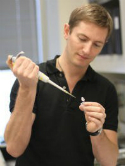| Abstract: |
In most taxa, halving of chromosome numbers during meiosis requires that homologous chromosomes (homologues) pair and form crossovers. Crossovers emerge from the recombination-mediated repair of programmed DNA double-strand breaks (DSBs). DSBs are generated by SPO11, whose activity requires auxiliary protein complexes, called pre-DSB recombinosomes. To elucidate the spatiotemporal control of the DSB machinery, we focused on an essential SPO11 auxiliary protein, IHO1, which serves as the main anchor for pre-DSB recombinosomes on chromosome cores, called axes. We discovered that DSBs restrict the DSB machinery by at least four distinct pathways in mice. Firstly, by activating the DNA damage response (DDR) kinase ATM, DSBs restrict pre-DSB recombinosome numbers without affecting IHO1. Secondly, in their vicinity, DSBs trigger IHO1 depletion mainly by another DDR kinase, ATR. Thirdly, DSBs enable homologue synapsis, which promotes the depletion of IHO1 and pre-DSB recombinosomes from synapsed axes. Finally, DSBs and three DDR kinases, ATM, ATR and PRKDC, enable stage-specific depletion of IHO1 from all axes. We hypothesize that these four negative feedback pathways protect genome integrity by ensuring that DSBs form without excess, are well-distributed, and are restricted to genomic locations and prophase stages where DSBs are functional for promoting homologue pairing and crossover formation. © The Author(s) 2021. Published by Oxford University Press on behalf of Nucleic Acids Research. |




